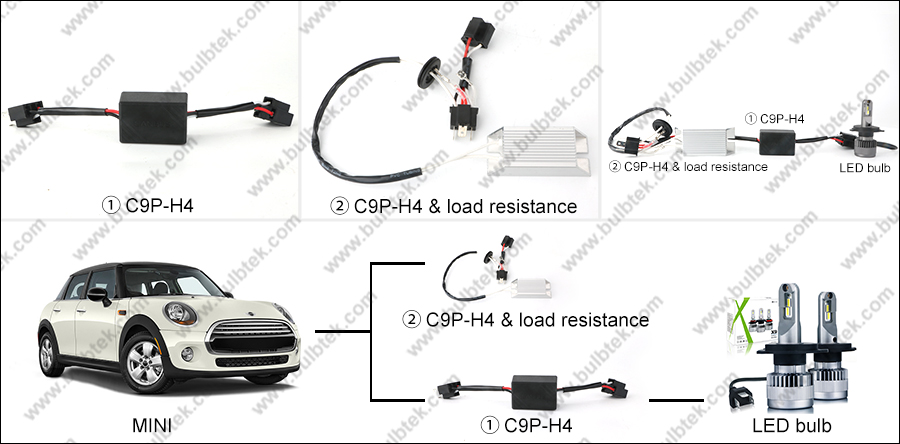Hi, welcome to our BULBTEK website. I believe everyone watched the British comedy of Mr. Bean. The car which Mr. Bean drives is the one we tested today. MINI is one of the brands of BMW group, it’s almost the most famous model of hatchback vehicles. It is deeply loved by modern women because of its personalized and fashionable appearance. Today we are lucky to get A MINI One Countryman 2012 year version. We will upgrade the headlight system by replacing the original halogen bulb with the LED headlight bulb. Let’s see what interesting changes would happen during the test.

As we see the MINI One is original halogen bulb, which is plug and play without a CANBUS decoder. Let’s take a look at the working effect of the original halogen lamp. First of all, we tested and observed the original halogen lamp. After starting the vehicle, the halogen lamp passed the self inspection. Then we tested the original halogen lamp in sequence, 1. Low beam, 2. High beam(push-to-switch), 3. High beam(pulling-to-switch), 4. High/low fast switch 10 times(high beam by pulling-to-switch). The halogen bulb works normally without flicker, off light or warning signal problems.
When the halogen lamp was switched to the high beam-by-push, the high beam was lighting up and the low beam was not, which is normal. However, what the interesting thing was that when the halogen lamp was switched to the high beam-by-pulling(normally using when warning the coming vehicles or passing over the ahead vehicles), the high and low beam were lighting up at the same time, which is abnormal, not happened on LED headlight bulbs.

Next, we replaced the halogen lamp with two series of the LED headlight bulbs with two kinds of CANBUS decoders. The LED bulbs were our X9 Compact Series 2.3A@13.5V, 30W and X9S High Power Series 3.2A@13.5V, 42W. Two CANBUS decoders were our upgraded D01-H4 CANBUS decoder and C9P-H4 CANBUS decoder with the detachable load resistance. Let’s see what would happen after the replacement.

X9 LED headlight bulb is 2.3A@13.5V, 30W, imported hydraulic fan, integrated design, driver built-in, CANBUS inside, 18 adapters, small size and easy installation.

First of all, we tested X9 LED in four methods, 1. Replacing halogen bulb with X9 LED, 2. X9 + upgraded D01-H4 CANBUS decoder, 3. X9 + C9P-H4 CANBUS decoder, 4. X9 + C9P-H4 CANBUS decoder + load resistance.
Firstly we tested in 1. Replacing halogen bulb with X9 LED, to see how it performed.
A. Starting the car, we saw X9 LED bulb flashed(dim on/off) 16 times during self inspection, meantime the dashboard showed warning signals of high beam to low beam to high beam.
B. Turning on the low beam, hyper flash + warning signal of high beam.
C. Switching to the high beam(push-to-switch), hyper flash + warning signal of low beam.
D. Switching to the high beam(pulling-to-switch), hyper flash + warning signal of low beam.
E. High/low fast switch 10 times(high beam by pulling-to-switch), hyper flash.
So MINI has badly hyper flash and warning signal problems after replacing halogen bulb with X9 LED.

Question: what is HYPER FLASH and how does it happen?
Hyper flash is the flashing/flickering in a certain frequency of lighting beam caused of a very tiny current fluctuation produced by PMW. Hyper flash is very hard to observed by human eyes, but easily captured by mobile phone or camera.
PWM is Pulse Width Modulation. This PWM probably is the reason leads to the hyper flash. Why does the PWM exist in the auto electronic circuit system? The advantages of PWM:
1. PWM can conveniently control the brightness of the light, the brightness gradient of the reading light is controlled in this way.
2. PWM has the highest efficiency in controlling the brightness of whole resistance load, which can reduce waste, that is, reduce heat generation. This function will extend the life span of lamps(include halogen headlight bulb).
3. Load fault detection can be easily realized, such as the forward short circuit, reverse short circuit, etc..
4. Because the reliability of the light load is low, but the lights of the vehicle is related to driving safety, it is necessary to use effective detection means to ensure the safety and reliability of the lights.
But why does the hyper flash only happen on LED bulbs, not on halogen bulbs?
Very good question, it’s because of the different light sources. Halogen bulbs emit lights from the filament which emits lighting brighter and brighter gradually, LED bulbs emit lights from chips which emits lighting fully and immediately. So if the PWM is 70ms/on & 30ms/off, the vision of halogen lamp’s lighting is totally same, no hyper flash captured by eyes or mobile, but the hyper flash of LED lamp’s lighting would be captured by mobile or camera, actually it can also be seen by human eyes if taking a very close and careful look.
Then why is PWM only used on some vehicles?
The cost.
1. As for the low class vehicles, the headlight bulbs get power from the battery power supply directly. Simple and cheap.
2. As for the high class vehicles, the electricity which is output from battery power supply should be converted before transmitted to the headlight bulbs. The extra cost is a lot, moreover, the electronic system is more complicated.

Let’s continue the test.
Secondly we tested in 2. X9 + upgraded D01-H4 CANBUS decoder.
A. Starting the car, no flash, no warning.
B. Turning on the low beam, no hyper flash, no warning.
C. Switching to the high beam(push-to-switch), hyper flash, warning signal of low beam.
D. Switching to the high beam(pulling-to-switch), hyper flash, warning signal of low beam.
E. High/low fast switch 10 times(high beam by pulling-to-switch), hyper flash of high beam, no warning.
So this time it was not as bad as the first test, but the problems remained.

Thirdly we tested in 3. X9 + C9P-H4 CANBUS decoder.
A. Starting the car, no flash, no warning.
B. Turning on the low beam, no hyper flash, no warning.
C. Switching to the high beam(push-to-switch), no hyper flash, warning signal of low beam.
D. Switching to the high beam(pulling-to-switch), no hyper flash, warning signal of low beam.
E. High/low fast switch 10 times(high beam by pulling-to-switch), no hyper flash, warning signal of high beam.
No hyper flash occurred, but the warning signals remained.

Fourthly we tested in 4. X9 + C9P-H4 CANBUS decoder + load resistance.
A. Starting the car, no flash, no warning.
B. Turning on the low beam, hyper flash, no warning.
C. Switching to the high beam(push-to-switch), no hyper flash, no warning.
D. Switching to the high beam(pulling-to-switch), no hyper flash, no warning.
E. High/low fast switch 10 times(high beam by pulling-to-switch), hyper flash of low beam, no warning.
No warning occurred, but the hyper flash of low beam remained.

Conclusion, there is no perfect CANBUS solution for MINI with X9 LED headlight bulb. Looks like it’s more complicated of relacing to LED headlight bulb than other brands’ vehicles. Automobile manufacturers have their own different design concepts in not only the appearances but also the structure and electronic circuit system, so we need to solve the CANBUS decoding problems according to the specific electronic circuit system of different vehicles’ models when replacing LED headlight bulbs.
Then we would test another high power LED headlight bulb X9S in the same way of four methods, we would see how the X9S performed in MINI while comparing with X9 series.
X9S LED headlight bulb is 3.2A@13.5V, 42W, high power, imported hydraulic fan, integrated design, external driver, CANBUS inside, 18 adapters, small size and easy installation.

Firstly we tested in 1. Replacing halogen bulb with X9S LED, to see how it performed.
A. Starting the car, we saw X9 LED bulb flashed(dim on/off) about 10 times during self inspection, meantime the dashboard showed warning signals of high beam to low beam to high beam.
B. Turning on the low beam, hyper flash.
C. Switching to the high beam(push-to-switch), hyper flash + warning signal of low beam.
D. Switching to the high beam(pulling-to-switch), hyper flash + warning signal of low beam.
E. High/low fast switch 10 times(high beam by pulling-to-switch), hyper flash.
Just like X9 LED, there were still badly hyper flash and warning signal problems after replacing halogen bulb with X9S LED, proved that a CANBUS decoder is required.

Secondly we tested in 2. X9S + upgraded D01-H4 CANBUS decoder.
A. Starting the car, no flash, no warning.
B. Turning on the low beam, no hyper flash, no warning.
C. Switching to the high beam(push-to-switch), hyper flash.
D. Switching to the high beam(pulling-to-switch), hyper flash.
E. High/low fast switch 10 times(high beam by pulling-to-switch), hyper flash of high beam.
No warning occurred, but the hyper flash remained, so this time it was not as bad as the first test.

Thirdly we tested in 3. X9 + C9P-H4 CANBUS decoder.
A. Starting the car, no flash, no warning.
B. Turning on the low beam, no hyper flash, no warning.
C. Switching to the high beam(push-to-switch), no hyper flash, no warning.
D. Switching to the high beam(pulling-to-switch), no hyper flash, no warning.
E. High/low fast switch 10 times(high beam by pulling-to-switch), no hyper flash, only the warning signal of high beam showed up at the 6th time, then disappeared after switched to low beam, no more showed up during the following fast switches.
Almost succeed, just a small step close to success.

Before we started the fourth test, we reset the headlight electronic circuit by turning off car, replacing with halogen bulb again, starting the car, turning on the halogen lamp and turning off the car.
Fourthly we tested in 4. X9 + C9P-H4 CANBUS decoder + load resistance. Kindly notice the connect instruction as below:

A. Starting the car, no flash, no warning.
B. Turning on the low beam, hyper flash.
C. Switching to the high beam(push-to-switch), hyper flash.
D. Switching to the high beam(pulling-to-switch), no hyper flash, no warning.
E. High/low fast switch 10 times(high beam by pulling-to-switch), hyper flash of low beam.
No warning occurred, but the hyper flash remained.

Conclusion, hyper flash happened a lot, warning signal showed up very few, warning signals remains badly for test 1 without CANBUS decoder, high beam warning signal showed up once during high/low fast switches for test 3 with X9S LED + CANBUS.
During these tests, we conducted multiple groups of tests on the vehicle MINI One Countryman. It can be found that when replacing the LED headlight bulb, MINI is much different from most of the other vehicles we usually replaced. The electronic circuit system of MINI is much more complicated, PLUS, it’s H4 High/Low beam(different from single beams) which increasing the complexity of circuit. So it’s very hard to solve the CANBUS problems of hyper flash and warning signal.
There will be many different CANBUS decoding problems from different vehicles’ models(American, Japanese and German). Therefore, in the current market, there are various CANBUS decoders for consumers to use. Of course, most cars can be directly changed the bulbs without CANBUS decoding problems, most CANBUS problems occurs on the high level(such as BMW, Benz, Audi, etc.) and pick-up(Ford, Dodge, Chevrolet, etc.) vehicles. We keep carrying out various different tests on different vehicles. If you want to know or discuss more professional information about car lights, or give us suggestions, warmly welcome to contact us at any time. We BULBTEK will reply you as soon as possible. You can also follow our social media accounts for more information as below, on which we keep posting news.
Our ALIBABA shop: https://www.bulbtek.com.cn
More videos and pictures on our Facebook, Instagram,Twitter,Youtube and Tiktok.
Facebook: https://www.facebook.com/BULBTEK
Tiktok: https://vw.tiktok.com/ZSeNTkJKX/
Twitter: https://twitter.com/BULBTEK_LED
Youtube: https://www.youtube.com/channel/UCtRGpI_WpuirvMvv3XPWMEw
Instagram: https://www.instagram.com/bulbtek_led/
Come and check out our company website: https://www.bulbtek.com/

Post time: Sep-21-2022





